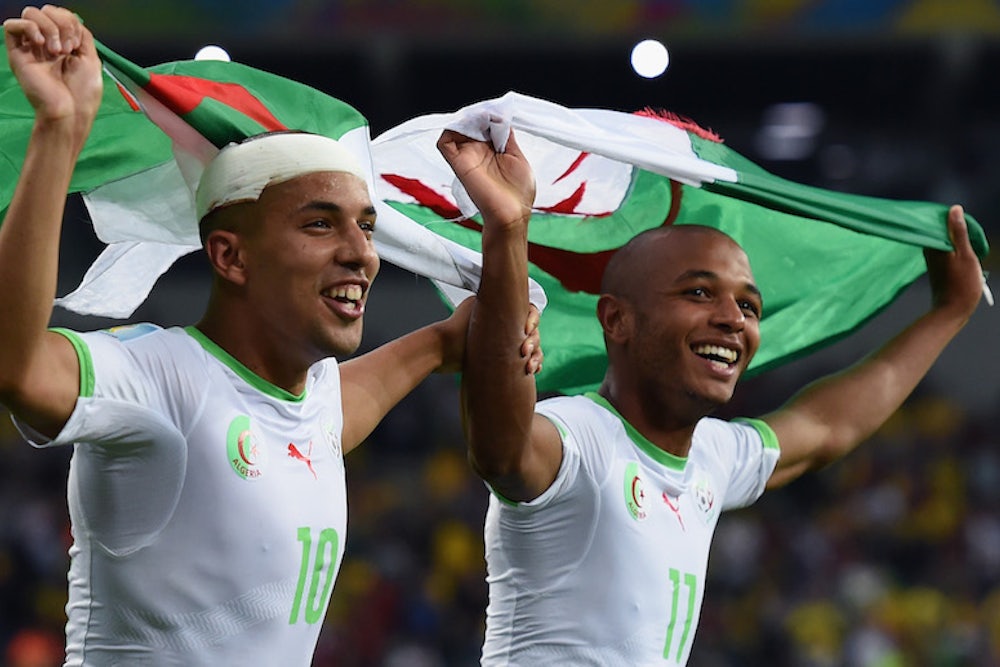I had been thinking of 1982 World Cup even before the tournament began. Socrates had been on my mind. I wanted to write an essay about him, but couldn’t come up with anything that hadn’t been said many times before. I worshipped him as a player and respected him as a man. I hated the Italy team that defeated Brazil, thought them too cynical for some reason, but not as much as I hated the West German team. I hated them before the tournament that year and loathed them after that scandalous game against Austria. All I had to do was see Rummenigge on the small screen and I’d feel the blood in my face boil, steam whistling out of my ears, and imaginative curses in at least three languages escaping my lips.
It has been 32 years. I thought I had amputated all the anger and hate of that game, that whatever frisson of rage I felt when I was reminded of it was simply a phantom limb sensation.
And now Algeria is playing Germany in the next round. Winner takes all!
Having seen both teams play, I don’t foresee Algeria winning, but that’s not the point. The fact that they are is a reminder for us—I mean, for post-colonial citizens—of how things are—I mean, how things used to be 32 years ago.
Oh, and the German coach, Joachim Löw, will probably have to study the films this time. Extra homework.
Allow me to review the highlights of that game and postgame reactions for you.
In 1982, Algeria made their first appearance at the World Cup. I believe it was the first Arab country to do so. Their opening game in the group stage was against the reigning European champions, West Germany. No one expected the North Africans to win, definitely not the imperious Germans, who were one of the favorites, having qualified for the tournament with exquisite ease. Players with household names, Littbarski (hate him), Matthäus (hate him), Breitner (hate him), Rummenigge (hate him, hate him, hate . . . oh, never mind) were to play, you know, Arabs.
In a pregame news conference, one of the West German players said, "We will dedicate our seventh goal to our wives, and the eighth to our dogs."
To their dogs?
After the match, the West German coach admitted that neither he nor his players watched any game films of their opponent. Why bother? Who had time when you were so busy publicly mocking your opponent? There were jokes about smoking cigars and drinking cognac while playing the game.
Smoke this, Rummenigge.
Algeria went on to win the game 2-1, and it was no lucky win. They outplayed the European Champions. The right fullback, Chaabane Merzekane, attacked the flank as if he were channeling Carlos Alberto. The Germans looked lost and befuddled. When they tied the game at 1-1, celebrating, thinking that the world order had been restored, Lakhdar (the green one, in Arabic) Belloumi scored within seconds of the kickoff, a gorgeous team goal that took my breath away.
I watched, heart distending with joy, babbling to myself in front of my television. When the game ended I called my father in Lebanon, just had to: Yes, I know there’s a civil war going on, and the Israelis have invaded our country, but how about that fucking game?
The joy lasted only a few days. Algeria lost to Austria in their next game, then won against Chile 3-2. The final group game was Germany versus Austria. The only possible way Algeria would not progress was if Germany won 1-0, in which case all three teams would have six points and the North Africans would come in third because of goal difference. Any other score and Algeria would go through with either of the Europeans.
Thirty-two years later, I no longer remember the game in detail, but I do the feelings of disgust and despair. The West German scored early, in the first ten minutes, and that was it, both teams stopped playing. They didn’t even pretend to play soccer. No player took a shot, no one attacked, no one defended, one of the most cynical displays in the history of sport.
They should have brought out their cigars and cognac for that match.
The spectators were offended, the television announcers horrified, but not the European players. Unrepentant, they sashayed to the next round.
“Naturally today's game was played tactically,” said Austrian official Hans Tschak, before launching a jeremiad, “but if 10,000 'sons of the desert' here in the stadium want to trigger a scandal because of this, it just goes to show that they have too few schools. Some sheikh comes out of an oasis, is allowed to get a sniff of World Cup air after 300 years and thinks he's entitled to open his gob.”
All right, I was wrong.
Thirty-two years later, I’m still angry.
Did anyone get punished for that scandal? Nope. FIFA, the paragon of probity, decided that henceforth the final group games would be held simultaneously. Woot!
So now, 32 years later, they will play again. The world isn’t the same, the teams aren’t the same, not the players. Hell, this German team has at least one sheikh who’d come out of an oasis, Khedira, and quite a few Turks and Africans and Poles. Other than Merkel and a few politicians, not many Germans remain as imperious. I actually like this team quite a bit; they play beautifully, and three of them are Arsenal players.
Thirty-two years later, how can I root against this team with Özil, BFG Mertesacker, and Podolski?
Easily.
